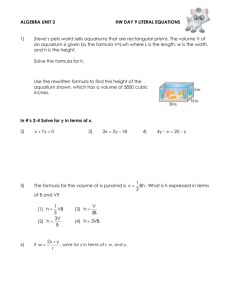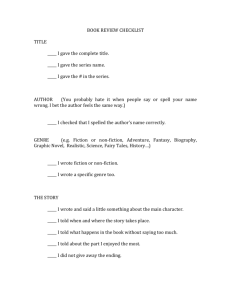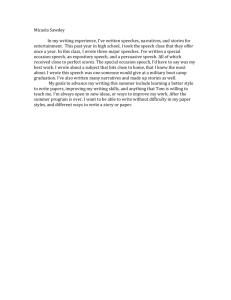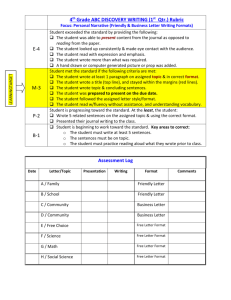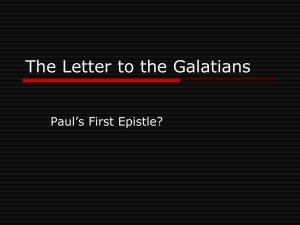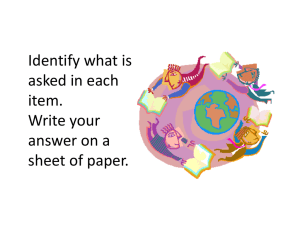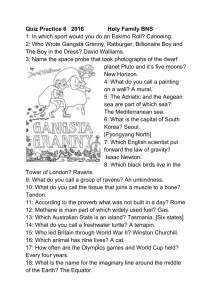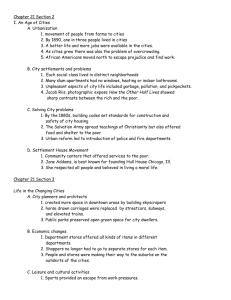Books literature, reading, favourite Anglo – American writers
advertisement
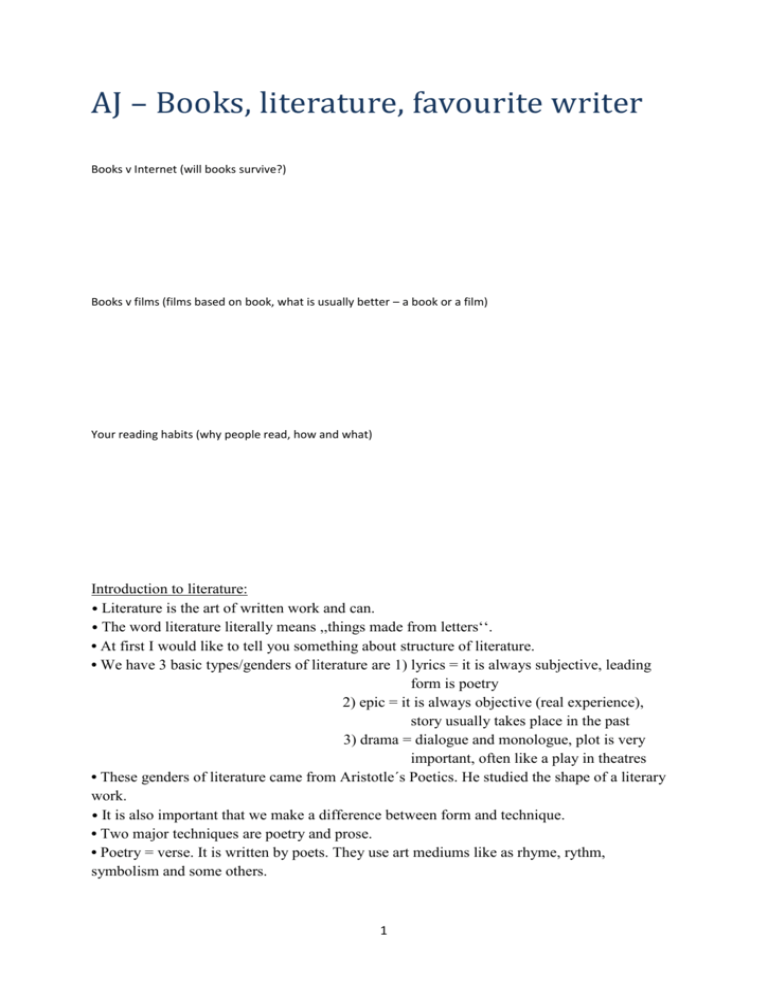
AJ – Books, literature, favourite writer Books v Internet (will books survive?) Books v films (films based on book, what is usually better – a book or a film) Your reading habits (why people read, how and what) Introduction to literature: • Literature is the art of written work and can. • The word literature literally means ,,things made from letters‘‘. • At first I would like to tell you something about structure of literature. • We have 3 basic types/genders of literature are 1) lyrics = it is always subjective, leading form is poetry 2) epic = it is always objective (real experience), story usually takes place in the past 3) drama = dialogue and monologue, plot is very important, often like a play in theatres • These genders of literature came from Aristotle´s Poetics. He studied the shape of a literary work. • It is also important that we make a difference between form and technique. • Two major techniques are poetry and prose. • Poetry = verse. It is written by poets. They use art mediums like as rhyme, rythm, symbolism and some others. 1 • Two major forms are fiction and non – fiction. Non – fictions are about something, what really happened. Fictions are made up stories. Basic facts from the history of literature • The earliest surviving work of literature is The Epic of Gilgamesh. It is an epic poem from Mesopotamia and main character is Gilgamesh, the king of Uruk. 4 000 B.C. • Bible is a canonical collection of texts considered sacred in Judaism od Christianity. Bible is structured in two parts – Hebrew Bible (includes historical, liturgical, legal and literary texts) and Christian Bibles . • Indian literature is famous for scriptures – Vedic Sanskrit (Vedas) . Epic of mahábhárata and Rámájana. • Antique literature – Greek literature British literature 1) The old English literature and Anglo – Saxon period • The earliest British literature was written in the Anglo–Saxon language. • It was poetry dealing with heroic or legendary episodes from the history of the Germanic tribes. • The most famous is the epic (heroic) poem known as Beowulf, which was written by an unknown author probably in the 8th century. 2) The middle English literature • During the middle Ages the Roman Catholic Church was strongly criticized by John Wycliffe. He was a professor at Oxford University. He and translated the whole Bible into English. • Geoffrey Chaucer wrote Canterbury Tales It is a brilliant portrait of 30 pilgrims who travel to Canterbury and each tells four stories. In this way we are given a vivid picture of the l4 century society. • In 1476 William Caxton introduced printing In England which helped spread literature and philosophy. 3) The Renaissance • One of the most important British author of all times is William Shakespeare. • He was born in Stratford-upon-Avon. He got married with older woman Ann. They had 5 children, 2 daughters, twins and 1 son, named Hamlet who died at 11 years. • He started his theatre work in 2 theatres - Theatre and Curtain. Both (theatres) were owned by James Burbage. He owned one stock in the Globe Theatre. • He wrote more than 37 plays and sonnets. Comedies – Midnight Summer, The Merchant of Venice, Comedy of Error; historical plays – Henry VIII, V, IV; tragedies – Romeo and Juliet, King Lear, Othello, Macbeth, Hamlet. 4) Neoclassical Period / The Age of Reason • Daniel Defoe was a journalist and pamphleteer and founder of English novel. He is famous for his popular novel Robinson Crusoe. It is the story about man living on a lonely island. • Jonathan Swift was a critic. He wrote satirical pamphlets on all unfair events in British society. He criticizes politics in England, kingdoms, corruption, armies, bad politicians, etc. His most popular work is Gulliver´s travels. 2 5) Romanticism • This period is characterized by Lake Poet´s – William Wordsworth, Samuel Taylor Coleridge. They created their works in a lake district. Their works are mainly about nature. We can read about grass, trees and dew. ( lyrical ballads) • Walter Scott was a founder of the historical novel. His most famous work is Ivanhoe. • Henry Fielding was a journalist, lawyer and playwright. Fielding is considered as the founder of the Modern English novel. He wrote a realistic novel Tom Jones where he described the life in the 18th century England. 6) Victorian Age (Critical Realism) • Charles Dickens described the true life of poor people in England in the 19th century. He combined comic and serious situations and accused bath the aristocracy and the middle class of acting heartlessly towards the common people. Among his major novels belong David Copperfield, Great Expectations, and Oliver Twist. • Two of the best authors of this time are Emily Bronte who wrote Wuthering Heights and Charlotte Bronte, her sister who wrote Jane Eyre. Both are about moral and psychological problems. 7) The Modern Age • Oscar Wilde was from Dublin. He reacted against Victorian society and its values/stress on decency, good family, conventional behaviour/. He provoked the society by wearing extravagant clothes, behaving in a non-conformist way and writing immoral books. He went through a lot of scandals and finally went to live in France but was unable to earn his living. He lived of the generosity of his friends.He wrote The Picture of Dorian Gray, many excellent dramas and fairy tails in which he sympathizes with the poor and unhappy. • George Bernard Shaw is the most famous personality in drama of this period. He attacked the whole society. He wrote Pygmalion. He was awarded the Nobel Prize in 1925. 8) Contenporary Literature • George Orwell wrote excellent allegorical novels criticizing totalitarian society. You probably recognize the names of Animal Farm and 1984 - describes a future world where every word and action are controlled and seen by the state. The special TV watches people even in their bedrooms. The language undergoes significant changes too. It‘s the world without love, friendship, privacy, humor or truth. The all-powerful, All-seeing Party controls everything. The symbol is Big Brother whom nobody knows. A new language Newspeak is formed. The main hero who wants to protest - love and live normally is totally crashed - not physically only, but psychically as well / the prison/. . • Everyone should also known names as Jane Austen (Pride and Prejudice), Rudyard Kipling (The Jungle Book), John Galsworthy (Forsyte Saga), Agatha Christie (Hercule 3 Poirot, Ms. Marple), James Joyce (Ulysses), Virginia Woolf, William Goldwing, Kingsley Amis, R.R.Tolkien and John Osbourne. American literature 1) 18th century • Washington Irving wrote about history of settlement of the USA. He is famous for his Sketch Book ( traditional Indian stories against white people). He also wrote (about) History of New York. 2) 19th century • Edgar Allan Poe is the founder of detective stories. He became an orphan. He got married to his 13-year old cousin. Poe started to write because he needed money. He is famous for The Raven (Never more), The Black Cat, The Pit and The Pendulum and The Red Mask. American Renaissance • Herman Melville wrote The Moby – Dick. It is about whaleboat which name is Pequod. The Civil War and The Gilded Age (poor x rich – difficulties) • Walt Whitman is considered as the founder of American poetry. He wrote The Leaves of Grass. • Mark Twain was a humorist and story writer. He wrote a novel The Gilded Age. Twain also wrote The Adventured of Tom Sawyer and The Adventured of Huckleberry Finn. Both works are about adventures of boyhood and free child. Realism and naturalism • Jack London was a short story writer. He was born into poor family. London travelled to Alaska, where he got inspiration for his novels. He wrote autobiographical work Martin Eden. It is about a young proletarian autodidact struggling to become a writer. th 3) 20 century • Francis Scott Fitzgerald is the author of Great Gatsby. Great Gatsby is about differences between higher and lower social class and about love. Lost Generation • Ernest Hemingway he was awarded the Nobel Prize. Ernest fought in wars (he was seriously injured in the Spanish war) where he worked as a newspaper reporter. He loved travelling, fishing and adventures. At the end he committed a suicide. Hemingway is famous for The Old Man and The Sea, A Farwell to Arms, For Whom the Bell Tolls and Fiesta. The Great Depression (Economy Depression) • John Steinbeck´s most famous work is The Grapes of Wrath. It is a picture of poor family which is work for the fruit - growers in California. • Jerome David Salinger died in 2010. The Catcher in the Rye is his most famous work. This story is about a teenager Holden. • Very important authors are also William Styron with his Sophie´s Choice, Jack Kerouac, Eugene O´Neil and Allen Ginsberg 4
